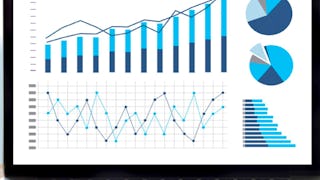![[Video thumbnail] Tips to master data analytics](https://images.ctfassets.net/wp1lcwdav1p1/2zLZPBhzoaRjEq4QmCoWHc/04116dcca35fc4330abdbd51e6b271ee/Tips_to_Master__Data_Analytics.jpg?w=330&h=216&q=60&fit=fill&f=faces&fm=jpg&fl=progressive)
Is Data Analytics Really That Hard? Tips for Rising to the Challenge
This video is here to tell you - learning data analytics IS achievable, and we'll show you how!
January 30, 2025
Article
As an entry-level data analyst, you’ll be gleaning insights from data to answer questions and solve problems that inform business decisions. Get started on this career path with the resources below.

Learn the basics of data analysis

Skills you'll gain: Data Storytelling, Big Data, Data Analysis, Data Cleansing, Apache Hadoop, Statistical Analysis, Data Visualization, Apache Hive, Data Mart, Data Warehousing, Data Transformation, Apache Spark, Data Science, Analytics, Data Lakes, Data Visualization Software, Relational Databases, Microsoft Excel
Beginner · Course · 1 - 3 Months

Skills you'll gain: Data Storytelling, Rmarkdown, Data Literacy, Data Visualization, Data Presentation, Data Ethics, Data Cleansing, Data Validation, Ggplot2, R (Software), Tableau Software, Sampling (Statistics), Presentations, Spreadsheet Software, Data Analysis, LinkedIn, Object Oriented Programming (OOP), Data Structures, Interviewing Skills, Applicant Tracking Systems
Build toward a degree
Beginner · Professional Certificate · 3 - 6 Months

Skills you'll gain: Tableau Software, Dashboard, Data Visualization, Business Intelligence, Interactive Data Visualization, Data Presentation, Data Storytelling, Business Analytics, Data Visualization Software, Data Analysis, Advanced Analytics, Trend Analysis, Forecasting, Data Cleansing, Data Preprocessing, Analytics, Data Manipulation, R (Software), Data-Driven Decision-Making, R Programming
Beginner · Specialization · 3 - 6 Months
Data analysts collect, clean, and interpret data sets to drive better business decisions. They can work in many industries, including business, technology, finance, science, medicine, and government.
As an entry-level data analyst, you’ll be expected to know the basics of data collection, modeling, analysis, and visualization. You’ll need to know how to use software tools like Microsoft Excel, SQL, or Tableau to pull data sets and organize them before synthesizing the insights for a business use case and presenting them to stakeholders.
Similar roles include data scientist, business analyst, market research analyst, and business intelligence analyst.
Read more about entry-level data analyst careers and tips:
Find your career track: Data Science Career Paths: Explore Roles & Specializations
Watch on YouTube: 7 Steps to Become a Data Analyst
Ready to start learning? Explore our catalog of data analysis courses or accelerate your career growth with a Coursera Plus subscription. When you enroll in either the monthly or annual option, you’ll get access to over 10,000 courses.
Entry-level data analysts can expect to make an average base salary of $63,537 with 0-1 years of experience, according to Glassdoor. That number goes up to $73,127 per year with 1-3 years of experience. Glassdoor. Data Analyst Salaries, https://www.glassdoor.com/Salaries/data-analyst-salary-SRCH_KO0,12.htm. Accessed February 5, 2024.
To become a data analyst, you’ll want to gain skills in data analysis, programming languages like SQL, Python, or R, and Microsoft Excel. Many entry-level data analyst jobs seek candidates with bachelor’s degrees, so it might be helpful to earn a degree in a related field. Build your skills with a professional certificate and start conducting data analysis, before applying for entry-level jobs and internships.
Some skills to add to a data analyst resume include data analysis (highlight examples of collecting, cleaning, interpreting, and visualizing data), programming languages such as SQL, Python, or R, experience with programs like Microsoft Excel, Google Sheets, SAS, and Tableau, communication, problem solving, and project management.